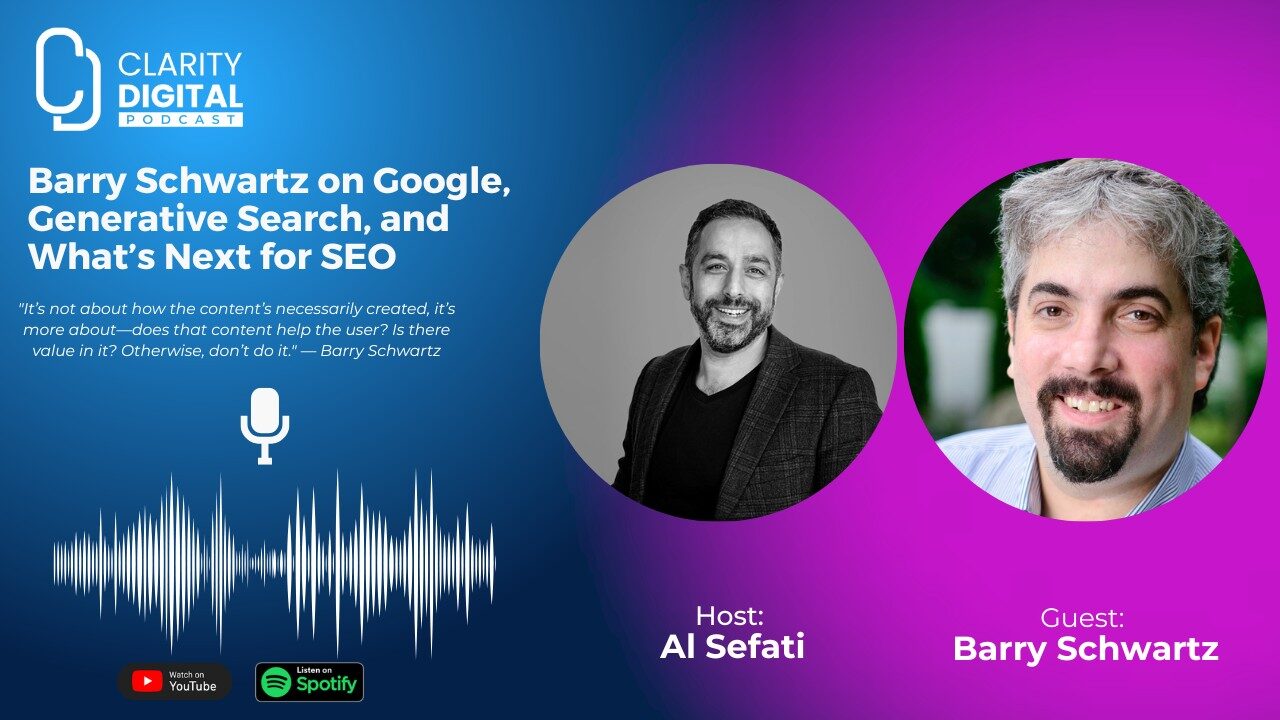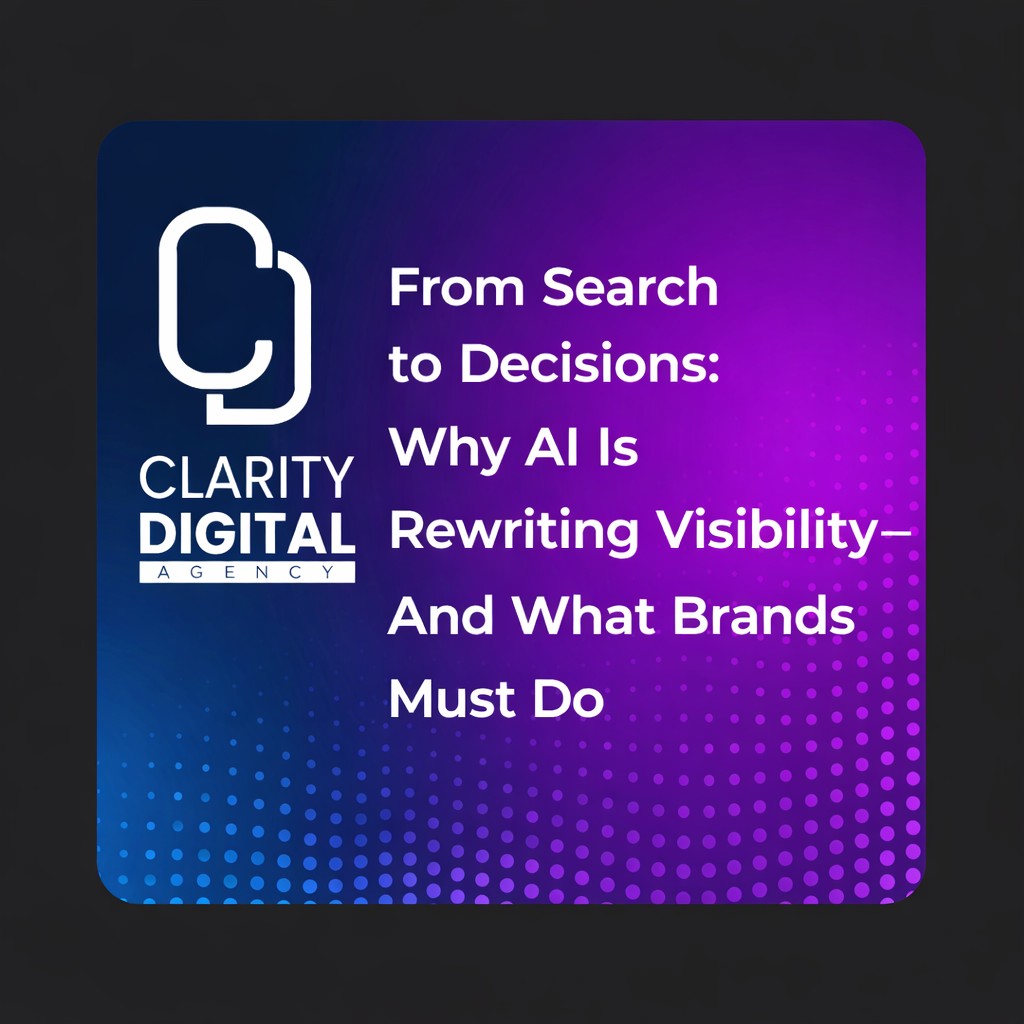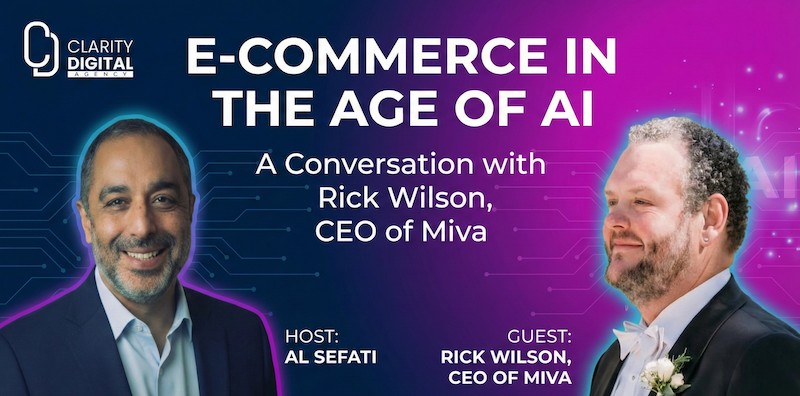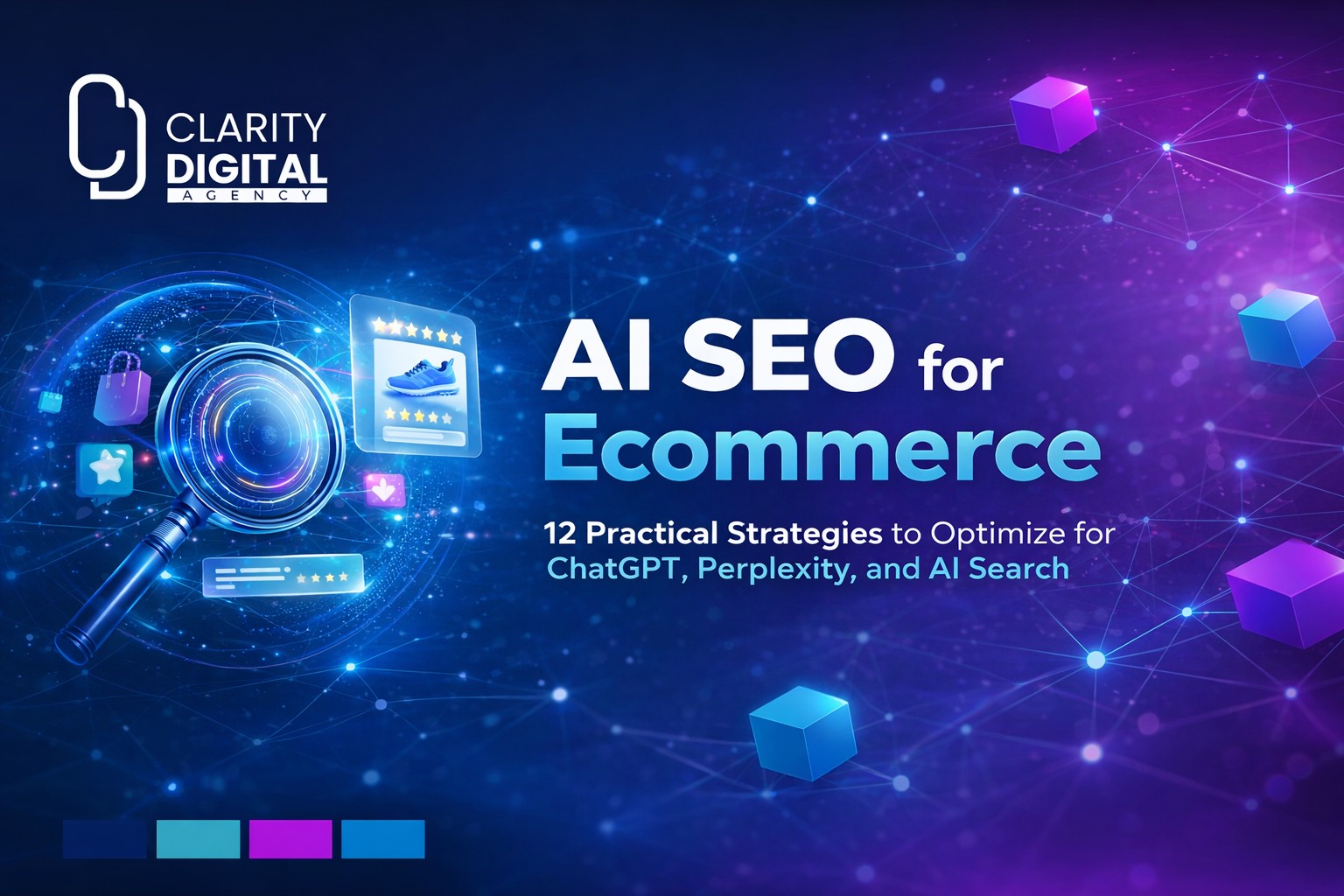In this episode of the Clarity Digital Pod, host Al Sefati welcomes Barry Schwartz—renowned search industry journalist, founder of Search Engine Roundtable, and a long-time contributor to Search Engine Land. With over two decades of experience tracking and reporting on Google updates and the evolving search landscape, Barry offers unmatched insights into where search is headed—especially as AI-powered tools like ChatGPT, Perplexity, and Google’s AI Overviews gain traction.
Together, Al and Barry discuss the state of SEO in 2025, the rise of generative search, how AI is transforming both organic and paid search, and why digital branding, audience building, and authentic content have never been more critical. Whether you’re a seasoned SEO, paid media strategist, or a marketing leader navigating AI disruption, this episode delivers valuable takeaways for the future of search.
Here’s a great quote from Barry from the interview:
“It’s not about how the content’s necessarily created, it’s more about—does that content help the user? Is there value in it? Otherwise, don’t do it.” — Barry Schwartz
Watch the full conversation below.
Podcast Summary
When it comes to understanding the ever-evolving world of search engine optimization (SEO), few voices are as respected as Barry Schwartz. A cornerstone of the search marketing community, Barry has been documenting and analyzing Google updates and search industry changes for over two decades. In this episode of the Clarity Digital Pod, I had the pleasure of chatting with Barry about the state of SEO, the rise of AI-powered search, the future of paid media, and the importance of authentic content and branding.
This conversation is especially relevant to SEOs, digital marketers, and business leaders who are navigating a landscape filled with algorithm updates, AI disruptions, shrinking organic traffic, and blurred lines between paid and organic results.
1. Barry Schwartz: The Man Behind the Search Engine Roundtable
Barry introduced himself with characteristic humility, though his resume speaks volumes. He founded Search Engine Roundtable, a blog that’s become essential reading for marketers keeping up with the nuances of Google’s search algorithm updates. He’s also a long-time contributor to Search Engine Land, previously wrote for Search Engine Watch, and runs a software company—RustyBrick—that builds web and mobile applications.
While he doesn’t consider RustyBrick an agency in the traditional sense, Barry’s work has indirectly impacted countless agencies and in-house marketers, helping them stay informed and adapt to Google’s ever-changing world.
2. The State of SEO in 2025: Multiple Search Engines Are Back
Barry and I discussed what’s happening in search now. For a long time, Google was the dominant player, but we’re starting to see a shift reminiscent of the early 2000s when multiple engines—Ask Jeeves, Lycos, and others—competed for market share.
Now, OpenAI’s ChatGPT search, Perplexity.ai, and Google’s own AI Overview and “AI Mode” are diversifying the space. Though Google still holds the lion’s share of search traffic, these new AI-driven tools are becoming important parts of the discovery journey, especially for B2B users and early adopters.
Barry noted that while ChatGPT and Perplexity are gaining popularity, their actual traffic numbers remain small compared to Google. That said, Google is taking the challenge seriously. With AI Overviews and AI Mode, Google is integrating more generative responses directly into the SERPs, signaling a future where zero-click results are the norm.
“Search isn’t what it used to be—and it’s not going back. If you’re not watching how AI is changing search, you’re already behind.”
3. What Is Google AI Mode?
AI Mode is a newer beta feature from Google, designed to offer a more conversational experience—similar to ChatGPT—within its search results. Unlike the static AI Overviews, AI Mode allows more interactive dialogue. Currently, it’s only available through Search Labs for users over 18 in the U.S., but it may roll out more broadly during the next Google I/O.
The takeaway here for marketers? Start experimenting now. Understanding how Google will blend chat-based discovery with traditional search is key to maintaining visibility.
4. What Should SEOs Be Doing Right Now?
Barry emphasized that the fundamentals of SEO haven’t changed—even as AI changes the surface of search. Marketers still need:
- Quality, original, and helpful content
- Strong technical SEO foundations
- Authority and trust (E-E-A-T)
- A focus on user experience
He warned against blindly relying on AI for content generation. While AI can assist with outlines, summaries, and even translations (as Reddit is doing with AI-based translations that Google appears to be indexing), marketers should avoid using AI to spin low-quality, redundant content.
The best use of AI is to improve workflow efficiency, automate redundant tasks, and support—not replace—human creativity.
5. Diversifying Beyond Google: First-Party Data & Branding
One of the most important insights Barry shared is that Google is sending less traffic to websites, particularly via organic search. As AI Overviews, zero-click results, and blended ads dominate the SERPs, the days of “get traffic just by ranking” are over.
Barry’s advice: build your audience and own your data.
- Invest in email capture and CRM growth
- Use SEO and PPC to drive top-of-funnel awareness but focus on nurturing the audience directly
- Avoid relying solely on any one platform
He also pointed out that branded search and direct traffic are more important than ever. Building a recognizable brand will help companies stay top-of-mind, especially when AI platforms start making recommendations.
“Start building your brand now—or AI will decide which brand gets the click later.”
6. Paid Search: Welcome to the AI-First Era
We also explored the state of paid search. Barry noted that Google Ads has long been integrating AI into its ad platform. Tools like Performance Max (PMax) and the newly announced “Google Ads AI Max” are reshaping how advertisers target, create campaigns, and measure results.
The days of tight keyword targeting and granular manual control are fading. Instead, Google encourages marketers to rely on its algorithms to target the right people, even if it means less transparency. This presents both a challenge and an opportunity—marketers must think more strategically and creatively to stand out.
Barry reminded listeners that despite the automation, marketers should remain vigilant. Machine learning models are only as good as the data—and the strategy—behind them.
7. Why Integrated Search Strategies Matter More Than Ever
Barry and I are aligned on this: SEO and paid search need to work together. Unfortunately, many companies still have these teams siloed.
Given the evolving SERP landscape, where paid ads, shopping results, organic listings, and AI summaries blur together, coordination is essential. Shared keyword research, unified messaging, and holistic attribution can maximize performance.
This is especially true for ecommerce brands where the user journey often spans paid ads, organic content, and shopping feeds.
8. Digital PR, Branding, and Thought Leadership as SEO Fuel
Barry and I both see digital PR and branding as essential to modern SEO. As link-building becomes riskier and less effective, authentic brand mentions and quality citations matter more.
Thought leadership—via podcasts, video, social media, and articles—helps build trust and visibility that AI models and users alike can recognize.
Barry practices what he preaches. His blog at Search Engine Roundtable is lean, fluff-free, and deeply trusted in the SEO world. He views blogging as a hobby, not a job, which is probably why it remains so authentic and valuable.
9. The Future of Traffic: AI Agents & Zero-Click SERPs
Looking ahead, Barry sees a world where AI agents answer questions for users—without ever sending them to a website. Google’s AI Overviews, Bing Copilot, and ChatGPT’s integration with real-time search are just the beginning.
In this future, what is said about your brand will matter as much as—or more than—where your brand ranks.
SEO strategies will need to focus on getting cited in AI responses, ranking for brand terms, and building visibility that machines recognize. This will require a mix of:
- Semantic content optimization
- Structured data
- Digital PR
- First-party content strategies
10. Final Thoughts from Barry Schwartz
Before wrapping, I asked Barry what advice he had for marketers in 2025 and beyond. His answer was simple:
“Keep doing what works. Write great content. Be useful. But build your audience. Don’t depend on Google alone.”
And he’s right. Whether through blogging, email, events, podcasts, or partnerships, marketers need to think beyond traffic and build meaningful connections with audiences.
Clarity Digital: A Strategic Partner in the New Search Era
If this conversation reinforced anything, it’s that search marketing isn’t dead—it’s evolving. And with that evolution comes a need for clarity, integration, and strategic thinking.
At Clarity Digital, we help marketing teams make sense of this complex ecosystem. From enterprise SEO to AI-powered advertising strategies, we bring experience, execution, and insights to the table.
Need a smarter approach to your search marketing in the AI era? Contact us and let’s build it together.





